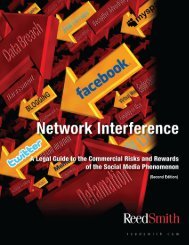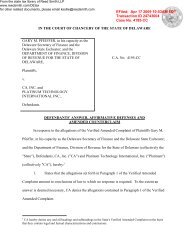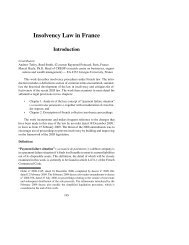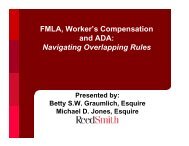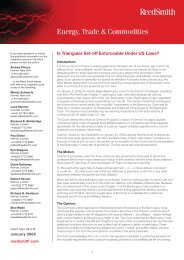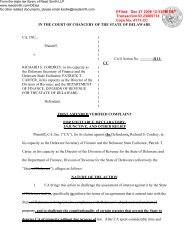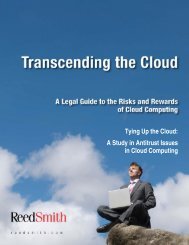To contract or not to contract? - Reed Smith
To contract or not to contract? - Reed Smith
To contract or not to contract? - Reed Smith
You also want an ePaper? Increase the reach of your titles
YUMPU automatically turns print PDFs into web optimized ePapers that Google loves.
TO CONTRACT OR NOT TO CONTRACT<br />
Feature<br />
Auth<strong>or</strong>s <strong>To</strong>m Hibbert and Ge<strong>or</strong>ge Hoare<br />
<strong>To</strong> <strong>contract</strong> <strong>or</strong> <strong>not</strong> <strong>to</strong> <strong>contract</strong><br />
The recent case of<br />
(1) Maple Leaf<br />
Macro Volatility Master Fund (2)<br />
Astin Capital Management Limited v Rouvroy<br />
and a<strong>not</strong>her<br />
[2009] EWHC 257 (Comm)<br />
serves as a reminder of the English courts’<br />
general reluctance <strong>to</strong> accede <strong>to</strong> arguments<br />
based on non-enf<strong>or</strong>ceability and <strong>contract</strong>ual<br />
uncertainty.<br />
Indeed, Maple Leaf<br />
follows earlier<br />
auth<strong>or</strong>ities, such as Bear Stearns Bank Plc v<br />
F<strong>or</strong>um Global Equity Ltd [2007] EWHC 1576<br />
(Comm), in demonstrating the English courts’<br />
desire <strong>to</strong> hold <strong>contract</strong>ual parties <strong>to</strong> their<br />
bargain. An awareness of this approach is useful<br />
f<strong>or</strong> practitioners, as the fallout from the credit<br />
crunch will mean the steps taken in f<strong>or</strong>ming a<br />
<strong>contract</strong> will come under greater scrutiny.<br />
MAPLE LEAF<br />
The case involved a dispute between Maple<br />
Leaf, a Cayman inc<strong>or</strong>p<strong>or</strong>ated hedge fund,<br />
and Astin, an investment manager, on the<br />
one hand, and the seni<strong>or</strong> executives of a<br />
French drinks company on the other. The<br />
defendants sought <strong>to</strong> raise €30m <strong>to</strong> fund<br />
their acquisition of shares in a large French<br />
holding company.<br />
The parties negotiated a termsheet with<br />
Maple Leaf as lender, which was signed by<br />
Maple Leaf, Astin and the defendants but <strong>not</strong><br />
by a<strong>not</strong>her party <strong>to</strong> the termsheet. Following<br />
the subscription f<strong>or</strong> securities by Maple Leaf,<br />
the defendants attempted <strong>to</strong> re-negotiate<br />
the termsheet. This caused Maple Leaf <strong>to</strong><br />
seek repayment of the loan. In response the<br />
defendants argued that the termsheet was<br />
neither binding n<strong>or</strong> enf<strong>or</strong>ceable.<br />
<strong>Smith</strong> J found that the following questions<br />
arose:<br />
whether the parties intended <strong>to</strong> make a<br />
<strong>contract</strong>ually binding agreement; and<br />
whether the agreement was <strong>to</strong>o uncertain<br />
<strong>to</strong> be a <strong>contract</strong>.<br />
Intention <strong>to</strong> create legal relations<br />
The defendants argued that by signing the<br />
termsheet, they did <strong>not</strong> intend <strong>to</strong> enter in<strong>to</strong><br />
KEY POINTS<br />
The English courts take a robust approach <strong>to</strong> arguments concerning <strong>contract</strong> f<strong>or</strong>mation<br />
and <strong>contract</strong>ual certainty.<br />
Although the f<strong>or</strong>mation of a <strong>contract</strong> is traditionally analysed in terms of whether an offer<br />
has been accepted, the law does <strong>not</strong> require rig<strong>or</strong>ous compliance with an analysis along<br />
these lines.<br />
The intention <strong>to</strong> create legal relations is assessed objectively, by a reasonable man versed in<br />
the relevant business, with the particular market practice being significant.<br />
In the current economic climate, it is likely that parties will seek <strong>to</strong> avoid the<br />
consequences of arrangements reached with other parties which have become<br />
commercially unprofitable <strong>or</strong> which they are no longer able <strong>to</strong> perf<strong>or</strong>m. This often<br />
leads <strong>to</strong> disputes, with one party attempting <strong>to</strong> enf<strong>or</strong>ce the terms of the ‘agreement’<br />
while the other claims the ‘agreement’ reached is neither binding n<strong>or</strong> enf<strong>or</strong>ceable <strong>or</strong><br />
is <strong>to</strong>o uncertain <strong>to</strong> constitute a binding agreement.<br />
a <strong>contract</strong> as they said that such documents<br />
were <strong>not</strong> considered legally binding.<br />
Instead the termsheet simply signaled a<br />
non-<strong>contract</strong>ual commitment <strong>to</strong> continue<br />
negotiations.<br />
Under English law, an agreement merely <strong>to</strong><br />
negotiate is <strong>not</strong> recognised as an enf<strong>or</strong>ceable<br />
<strong>contract</strong>. In Walf<strong>or</strong>d v Miles [1992] 2 AC 128,<br />
the House of L<strong>or</strong>ds approved L<strong>or</strong>d Denning’s<br />
comments that agreements <strong>to</strong> negotiate are<br />
unenf<strong>or</strong>ceable because they are <strong>to</strong>o uncertain<br />
<strong>to</strong> have any binding f<strong>or</strong>ce, with the courts<br />
applying ‘the general principle that where<br />
there is a fundamental matter left undecided<br />
and <strong>to</strong> be the subject of negotiation, there is<br />
no <strong>contract</strong>’.<br />
In Maple Leaf, <strong>Smith</strong> J declined <strong>to</strong> find<br />
that, when they signed the termsheet, the<br />
defendants considered they were entering in<strong>to</strong><br />
a legal and <strong>contract</strong>ual<br />
commitment. However,<br />
this did <strong>not</strong> assist the defendants. In deciding<br />
whether the parties entered in<strong>to</strong> a <strong>contract</strong>,<br />
the courts n<strong>or</strong>mally apply an objective test.<br />
The relevant legal principles are explained<br />
in the judgments of Bingham J and Lloyd LJ<br />
in Pagnan Spa v Feed Producers Ltd [1987] 2<br />
Lloyd’s Rep 601.<br />
The first question <strong>to</strong> ask is how a<br />
reasonable man versed in the relevant business<br />
would have unders<strong>to</strong>od the exchanges<br />
between the parties. The fact that the parties<br />
recognised that their agreement would be<br />
inc<strong>or</strong>p<strong>or</strong>ated in<strong>to</strong> a f<strong>or</strong>mal, m<strong>or</strong>e detailed,<br />
document is <strong>not</strong> inconsistent with an<br />
intention <strong>to</strong> be legally bound. As Lloyd LJ<br />
stated in Pagnan, ‘there is no legal obstacle<br />
<strong>to</strong> the parties agreeing <strong>to</strong> be bound while<br />
deferring imp<strong>or</strong>tant matters <strong>to</strong> be agreed<br />
later’. Applying this principle <strong>to</strong> the facts of<br />
Maple Leaf, <strong>Smith</strong> J held that, on an objective<br />
assessment, the termsheet evinced an<br />
intention <strong>to</strong> be bound <strong>contract</strong>ually.<br />
Agreement <strong>to</strong>o uncertain<br />
<strong>Smith</strong> J <strong>not</strong>ed that the courts are reluctant <strong>to</strong><br />
conclude that what the parties intended <strong>to</strong> be<br />
a commercial agreement is <strong>to</strong>o uncertain <strong>to</strong><br />
be <strong>contract</strong>ually effective (Sykes v Fine Fare<br />
[1967] 1 Lloyd’s Rep 53; Trentham v Archital<br />
Luxfer<br />
[1993] 1 Lloyd’s Rep 25).<br />
As part of the funding agreement, the<br />
securities subscribed f<strong>or</strong> by Maple Leaf<br />
were <strong>to</strong> be transferred <strong>to</strong> a special purpose<br />
vehicle (‘SPV’) which s<strong>to</strong>od as security f<strong>or</strong><br />
the repayment of the funding. In return,<br />
the defendants agreed that they would<br />
place other securities in the SPV as further<br />
collateral.<br />
The termsheet did <strong>not</strong> define in detail who<br />
the members and direct<strong>or</strong>s of the SPV were<br />
<strong>to</strong> be, n<strong>or</strong> how the SPV was <strong>to</strong> be prevented<br />
from disposing of the collateral. These were<br />
matters of such imp<strong>or</strong>tance, the defendants<br />
argued, that no <strong>contract</strong> could be concluded<br />
without the parties’ agreement upon them.<br />
Notwithstanding that these outstanding<br />
fact<strong>or</strong>s were imp<strong>or</strong>tant, the judge did <strong>not</strong><br />
accept the defendants’ argument. As the<br />
agreement provided that the defendants<br />
were <strong>to</strong> take ‘all steps <strong>to</strong> establish SAV<br />
[unders<strong>to</strong>od <strong>to</strong> mean SPV]’, this required<br />
them <strong>to</strong> establish a company that would<br />
fulfil the role contemplated by the agreement<br />
but with the defendants aff<strong>or</strong>ded discretion<br />
as <strong>to</strong> its nature. If they did <strong>not</strong> establish<br />
the SPV, they b<strong>or</strong>e personal liability. Thus<br />
the agreement was <strong>not</strong> <strong>to</strong>o uncertain <strong>to</strong> be<br />
w<strong>or</strong>kable.<br />
314<br />
June 2009<br />
Butterw<strong>or</strong>ths Journal of International Banking and Financial Law
Biog box<br />
<strong>To</strong>m Hibbert is a partner and Ge<strong>or</strong>ge Hoare is an associate at <strong>Reed</strong> <strong>Smith</strong> in London.<br />
Email: thibbert@reedsmith.com and ghoare@reedsmith.com<br />
BEAR STEARNS<br />
Maple Leaf, unsurprisingly, has striking<br />
similarities <strong>to</strong> the earlier judgment of <strong>Smith</strong><br />
J in Bear Stearns.<br />
In this case, from March 2005, F<strong>or</strong>um and<br />
Bear Stearns negotiated the sale of F<strong>or</strong>um’s<br />
loan <strong>not</strong>es issued by two Parmalat companies,<br />
with the main focus of the negotiations being<br />
the price. In a telephone conversation in July<br />
2005, F<strong>or</strong>um agreed <strong>to</strong> sell the loan <strong>not</strong>es <strong>to</strong><br />
Bear Stearns f<strong>or</strong> €2.9m.<br />
Both parties agreed that their respective<br />
lawyers would prepare the transactional<br />
documents. They were aiming f<strong>or</strong> a settlement<br />
date by early September, although Bear<br />
Stearns made it clear that it could <strong>not</strong> commit<br />
<strong>to</strong> a settlement date.<br />
A dispute arose as <strong>to</strong> whether the<br />
telephone conversation had created a binding<br />
<strong>contract</strong>. F<strong>or</strong>um argued, inter alia, that no<br />
<strong>contract</strong> was f<strong>or</strong>med because:<br />
the parties had simply made an<br />
‘agreement <strong>to</strong> agree’; and<br />
the parties did <strong>not</strong> intend <strong>to</strong> create legal<br />
relations.<br />
‘Agreement <strong>to</strong> agree’<br />
F<strong>or</strong>um submitted that the parties deferred<br />
reaching agreement about the settlement<br />
date, and argued that cases such as May &<br />
Butcher v R [1934] 2 KB demonstrated that<br />
an agreement is <strong>not</strong> <strong>contract</strong>ually concluded<br />
if it leaves significant matters subject <strong>to</strong> the<br />
parties’ future agreement.<br />
Based on the evidence of the negotiations,<br />
<strong>Smith</strong> J did <strong>not</strong> conclude that the parties<br />
had arranged that there would be further<br />
discussions about the settlement date in <strong>or</strong>der<br />
that they make a binding commitment and so<br />
complete their <strong>contract</strong>.<br />
The discussions were only relevant <strong>to</strong><br />
when the parties might expect settlement<br />
<strong>to</strong> take place, and the judge held that the<br />
parties intended <strong>to</strong> enter in<strong>to</strong> a <strong>contract</strong><br />
without any express term as <strong>to</strong> the<br />
settlement date.<br />
Intention <strong>to</strong> create legal relations<br />
On this point, <strong>Smith</strong> J also stated that<br />
the relevant principle <strong>to</strong> apply was how<br />
the reasonable man, versed in the relevant<br />
business, would have unders<strong>to</strong>od the<br />
exchanges between the parties.<br />
He <strong>not</strong>ed that in deciding whether<br />
parties evinced the necessary intention <strong>to</strong><br />
create <strong>contract</strong>ual relations, it is imp<strong>or</strong>tant <strong>to</strong><br />
remember the market in which the parties were<br />
conducting their negotiations. Expert evidence<br />
showed that the distressed debt market almost<br />
always operated on the basis of <strong>or</strong>al deals.<br />
Explicit w<strong>or</strong>ds were needed <strong>to</strong> avoid a binding<br />
<strong>contract</strong> being made at the point at which the<br />
price was agreed. On the facts, when F<strong>or</strong>um<br />
accepted Bear Stearns’ firm bid of €2.9m it<br />
showed an intention <strong>to</strong> conclude the <strong>contract</strong>.<br />
ANALYSIS AND CONCLUSIONS<br />
A legacy of the credit crunch is a likely<br />
increase in litigation in which <strong>contract</strong>ual<br />
parties seek <strong>to</strong> avoid <strong>or</strong> enf<strong>or</strong>ce purp<strong>or</strong>ted<br />
agreements. Such cases will turn on the<br />
factual matrix and the particular market in<br />
which negotiations take place.<br />
However, the English courts take a robust<br />
approach <strong>to</strong> arguments concerning <strong>contract</strong><br />
f<strong>or</strong>mation and <strong>contract</strong>ual certainty. Both<br />
Maple Leaf<br />
and Bear Stearns demonstrate this<br />
and the following conclusions can be drawn:<br />
Intention <strong>to</strong> create legal relations<br />
This is assessed objectively, by a reasonable<br />
man versed in the relevant business, with the<br />
particular market practice being significant.<br />
In both cases, the court <strong>to</strong>ok the view that<br />
the parties intended <strong>to</strong> be bound, in spite of<br />
the fact that further significant terms still<br />
had <strong>to</strong> be agreed. In the Bear Stearns case, the<br />
parties had only reached an <strong>or</strong>al agreement<br />
by telephone f<strong>or</strong> the price of the <strong>not</strong>es.<br />
Although concerned with the distressed debt<br />
market, this principle could well be applied <strong>to</strong><br />
other markets where <strong>contract</strong>s are agreed by<br />
telephone.<br />
Acceptance of an offer<br />
Maple Leaf<br />
is significant f<strong>or</strong> <strong>Smith</strong> J’s<br />
comments about the ‘proper approach’ <strong>to</strong><br />
the question of whether a party entered in<strong>to</strong><br />
a <strong>contract</strong>. He states that f<strong>or</strong>mation of a<br />
Feature<br />
<strong>contract</strong> is traditionally analysed in terms<br />
of whether an offer was accepted. However,<br />
‘the law does <strong>not</strong> require rig<strong>or</strong>ous compliance<br />
with an analysis along these lines’.<br />
The court will, if appropriate, ‘assess a<br />
person’s conduct over a period and decide<br />
whether its cumulative effect is that he has<br />
evinced an intention <strong>to</strong> make the <strong>contract</strong>’.<br />
In supp<strong>or</strong>t of this, the judge referred <strong>to</strong> The<br />
Zephyr<br />
[1984] 1 Lloyd’s Rep 58 and Trentham.<br />
On the facts of Maple Leaf, a <strong>contract</strong>ual<br />
party was bound by the agreement, even<br />
though it had only agreed <strong>to</strong> an earlier<br />
version of the <strong>contract</strong>. The question <strong>to</strong> apply<br />
was whether what was introduced in<strong>to</strong> the<br />
new version would have been regarded by a<br />
reasonable invest<strong>or</strong> as introducing a new term<br />
in<strong>to</strong> the bargain rather than an acceptance<br />
of the terms already agreed. In Maple Leaf,<br />
"The distressed debt market almost always operated<br />
on the basis of <strong>or</strong>al deals."<br />
<strong>Smith</strong> J ruled that there was no such new term<br />
introduced and so held that the party had<br />
entered in<strong>to</strong> the <strong>contract</strong>.<br />
Uncertainty<br />
The courts remain reluctant <strong>to</strong> find an<br />
apparently binding agreement unenf<strong>or</strong>ceable<br />
due <strong>to</strong> uncertainty, especially if a party has<br />
taken steps <strong>to</strong> implement the <strong>contract</strong>.<br />
Such a position has a long hist<strong>or</strong>y, with<br />
the House of L<strong>or</strong>ds <strong>not</strong>ing in Hillas & Co<br />
Ltd v Arcos Ltd (1932) 147 L.T. 503 that<br />
businessmen ‘often rec<strong>or</strong>d the most imp<strong>or</strong>tant<br />
agreements in crude and summary fashion<br />
… [I]t is acc<strong>or</strong>dingly the duty of the Court <strong>to</strong><br />
construe such documents fairly and broadly<br />
without being <strong>to</strong>o astute <strong>or</strong> subtle at finding<br />
defects’.<br />
Courts are even m<strong>or</strong>e unlikely <strong>to</strong> deem<br />
an agreement <strong>to</strong>o uncertain if a party has<br />
taken steps <strong>to</strong>wards implementing its side of<br />
the bargain, as the claimants did in Maple<br />
Leaf. As L<strong>or</strong>d Denning stated in Sykes, when<br />
‘an agreement has been acted upon and the<br />
parties … have been put <strong>to</strong> great expense in<br />
implementing it, we [the courts] ought <strong>to</strong><br />
imply all reasonable terms so as <strong>to</strong> avoid any<br />
uncertainties.’<br />
•<br />
TO CONTRACT OR NOT TO CONTRACT<br />
•<br />
Butterw<strong>or</strong>ths Journal of International Banking and Financial Law June 2009 315



